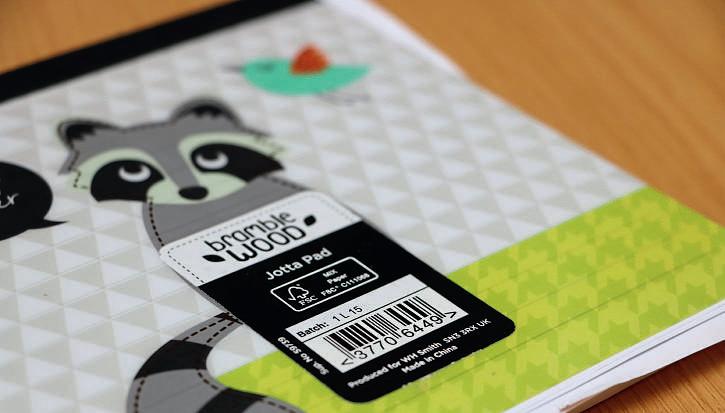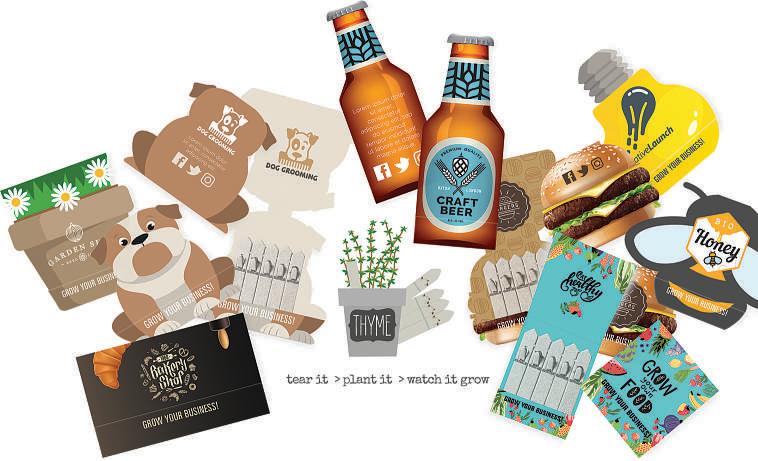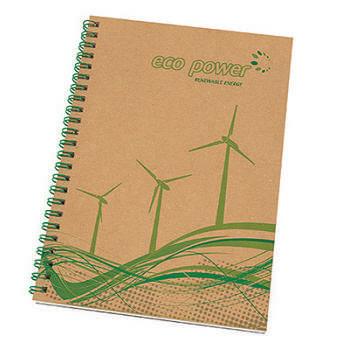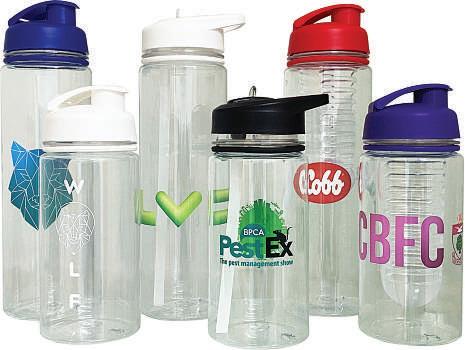
16 minute read
ACCEPTING THE SUSTAINABILITY CHALLENGE
Make the change
The challenge of sustainability is for everyone to embrace. How is the merchandise sector doing its bit?
Last year’s UN Climate Change Conference, COP 26, held in Glasgow, underlined the scale of the challenge facing humanity, and the need for everybody to play their part.
In recent weeks the Intergovernmental Panel on Climate Change (IPCC) has released its latest reports with the sombre message that it’s “now or never” when it comes to taking action to tackle climate change.
Greenhouse gas emissions must peak by 2025, and should be nearly halved this decade, to give the world a chance of limiting future heating to 1.5C above pre-industrial levels.
Alarm bells are ringing, if a little later than they should have been, but the alert has been sounded and governments are responding.
In the UK, the prime minister has seized on the challenge, but also the opportunity surrounding the environmental crisis to speak of a new green industrial revolution where the UK will innovate and lead on clean technologies.
But it is a challenge that cannot simply be achieved from the top down. Every aspect of our lives from work, to travel, leisure, agriculture and manufacture will change, and a thousand points of light will be required from businesses and organisations large and small.
Everyone has a role, and the good thing for the merchandise sector is that this has been accepted by many of the companies in the sector, not to mention their clients who are crying out for sustainable products.
DITCH THROW AWAYS
The drive is coming through from consumers too, according to research by product development consultancy, biild, indicating that people are tired of the throw away society.
It found overwhelming support for products that serve a greater purpose, in particular for those which are good for the planet.
The survey explored which product features were most relevant to consumers across the UK and what prices people would be willing to pay, and discovered: • 74% want long-lasting products that can be easily repaired. • 63% want products that are designed to be recycled. • 59% want products made from sustainable materials. • 58% want brands to develop products that help consumers reduce their environmental impact. • 3 in 4 would pay 10.6% above the average price for a purpose-led product.
DO THE RIGHT THING
The impetus to serve these emerging market needs is obviously commercial, but there are other factors at play, not least the feeling that we all have a part of play.
Many merchandise manufacturers have enviable records in areas such as driving down packaging waste, reusing and recycling materials, using alternative energy sources, and cutting carbon emissions. In some cases, they have been delivering a sustainable message ahead of a market being ready for it.
Companies like Senator have used green electricity in their production processes for
63%
want products that are designed to be recycled.

many years and it has been a frontrunner in developing eco products such as its bio range of pens that are derived from sugar cane, and makes use of recycled plastics in its production.
Briman manufacturers The Sweet People and Eat My Logo have taken great strides in introducing alternatives to plastic packaging.
UK Lanyards proudly claims that its products are air miles free, produced using solar power, and with staff based within eight miles of work with some walking or cycling.
Simon Adam, director of WCMA which produces badges and trophies, said it was important to do the right thing.
“We’re in a fortunate position where we can hopefully influence buying choices by highlighting the truth, good and bad, about our sector of the industry. We’re the ones who can best develop products made from the more sustainable materials and I believe it’s manufacturers like us that should be taking a lead in moving to a circular economy.

COMPANY VALUES
Gemma Richards, marketing manager at Fluid Branding said the company is definitely seeing more requests for sustainable products.
“It’s most evident within our tendering processes for new business for large corporate clients. Sustainability is on their horizons, and it’s something that we’re being asked more and more to showcase and demonstrate commitments and capabilities. It is an essential part of the tendering process now, which is where things have changed.”
However, Fluid’s drive to sustainability is also rooted in its status as a BCorp company, which means it is certified to meet rigorous standards of social and environmental performance, accountability, and transparency.
In practical terms, that includes such initiatives as its Tree with Every Order scheme which aims to plant up to a million trees responsibly as part of its plan to be carbo net zero by 2030. It has already hit 20,000.
The company also linked with the Salvation Army recently to donate excess PPE stock to the charity for use in its care homes.
PRODUCTION PROCESSES
As previously covered in Product Media, there are growing concerns about ‘greenwashing’ – the use of seductive imagery and vague product copy and descriptions to create an impression that a product is sustainable when closer scrutiny reveals that it is not as squeaky clean as suggested.
“There’s too much greenwashing going on with products described as eco that have little genuine claim to say that in the first place and people are claiming their products can be recycled where in the real world they simply won’t be,” says Simon Adam. To understand how sustainable a product is, buyers need to be cognisant of how it was manufactured and the entire life cycle of the product. Everything that is produced goes through five main life cycle stages: material extraction, manufacturing, packaging and transportation, use, and end of life. At each of these stages, there are inputs and outputs, flow-throughs, value losses, and potential gains. Buyers increasingly want to know about all of this. The rise of
What do accreditations mean?

When it comes to assessing sustainable products, there are a welter of certifications and accreditations that are wielded as proof of righteousness, but what are they actually telling you?
FSC - the Forest Stewardship Council is an international, non-governmental organisation dedicated to promoting responsible management of the world’s forests. Founded in 1994, it claims to be the world’s most respected and widespread forest certification system.
Choosing products with FSC labels means you are helping to take care of the world’s forests by supporting products that use materials from responsibly managed forests and recycled forest-based materials. uk.fsc.org
Sedex - a trade membership organisation that works with businesses to improve working conditions in global supply chains. Environmental sustainability is one aspect of what its systems enable and recognise.
Sedex says its online platform, tools and services help businesses operate responsibly and sustainably, protect workers and source ethically. sedex.com

ISO 14001 – the international standard that specifies requirements for an effective environmental management system (EMS). It provides a framework that an organisation can follow, rather than establishing environmental performance requirements. iso.org
Made in Britain – although not an environmental standard as such, Made in Britain status is an indicator that goods have not been transported from the other side of the world, as well as demonstrating they are of British manufacture. madeinbritain.org
ESG (environmental, social, governmental) management as a concern for blue chip organisations means they are less likely to sweep issues under the carpet and will have more questions relating to sustainability.
In granular terms, this means they will want to know what a product is made from, where the raw materials come from, and the conditions under which they were produced, what packaging has been used, how it was transported, and what end of life procedures are in place. And they will want to know in detail and in a way that can be verified.
Merchandise companies are grappling with these issues. For example, Briman member First Editions has a zero-waste production process that sees plastic reused in making its water bottles and plastic that can’t be used on site goes to another company which uses the waste to create guttering.
Other companies look to use couriers that have carbon offsetting plans, and have cut down on their use of plastics in packaging. With the introduction of a tax on plastic packaging, this also makes financial sense at a time when inflationary pressure is seeing input costs going up.
Promotional edibles company Eat My Logo developed an ‘Eco Promise’ to customers to spell out its commitments, including that its products would be packaged with, or be available as packaged with an ‘eco-friendly’ solution (bio-degradable, recyclable, zero-plastic, glassine packs).
Its products must use an eco-friendly void fill solution such as paper, and its production facility and offices follow an eco-guidance policy, relating to the use of electricity, disposal and waste.
WCMA has developed its own brand, Sustainable British Manufacturing to convey its credentials in this area. As a trade manufacturer that is anonymous to the end user, Sustainable British Manufacturing protects WCMA’s anonymity with the end users and allows distributors to show their customers the site and discuss it with them without the end users contacting WCMA directly.
The programme is associated with Ecologi, an internationally known organisation for supporting environmental projects, that allocates funding in the right places around the world. Many merchandise distributors support environmental projects through Ecologi.
“It is certainly the best known environmental project funding platform in our industry,” says Adam.
INNOVATIVE PRODUCTS
Necessity is the mother of invention, and merchandise companies have proved that in recent years as they have had to come up with products that meet the changing requirements of the market.
Plastic products have got a bad reputation in recent years, but it is mainly single use products that have been in the crosshairs of legislators through such initiatives as the aforementioned plastic packaging tax.






The British government and the EU have similar agendas when it comes to getting rid of ‘avoidable’ plastics. The plastic bag tax is held up as a model of how government intervention can work, reducing consumption of bags by 95% and encouraging the use of alternatives such as paper bags and reusable totes.
Plastic straws, stirrers and cotton buds have already been banned and the plan is to extend the ban to cutlery, plates, cups and balloon sticks where alternative materials can be used.
The direction of travel is clear and as the eco products at the recent Merchandise World show, there are already plenty of options for buyers.
RECYCLED PLASTIC MADE TO LAST
Merchandise is increasingly designed with longevity built in, to be both desirable and to fulfil an ongoing need. Products such as reusable coffee cups, cutlery sets and water bottles have in recent years become the preferred option for many consumers looking to reduce their own usage of one-off products.
One of First Editions best-selling products is the award-winning Tritan ‘bottle for life’, which is packed with eco credentials. Tritan has revolutionised the market for sustainable drinkware, delivering hydration on the go with a sturdy and shatterproof design.
The stylish bottles are UK-made, 100% BPA-free, dishwasher-safe and fitted with an easy-clean, leakproof drinking spout.
Carbon neutral tech
Carbon neutrality is even coming to tech in the form of recycled materials, natural materials and plastic free packaging in the last few years. Tech specialist Desktop Ideas is now moving to reduce further its carbon footprint.
The journey of reducing the footprint of products covers the manufacturing process, packaging, product materials and transport through the supply chain. Desktop Ideas is independently assessing all new items and many best sellers to quantify the product’s foot print in C02 grams. For example, the award-winning Mr Bio charge cable is weighing in at 85g C02 .
Once measured the carbon is offset in climate projects through the Gold Standard projects.
PAPER TIGERS
Plastic itself need not be the complete baddy it is made out to be, if it is used in recycled forms, says Andy Knight, owner of Cornwall-based CHX Products.
The company believes in making high quality promotional merchandise that is environmentally responsible while being mindful of the demands of the industry. It designs, manufactures and prints 100% eco promotional merchandise in its environmentally award-winning factory in Cornwall.
It has made more than 500 million items for customers using 100% recycled plastic sourced from the UK and its products are manufactured and printed using solvent free inks and designed specifically for the promotional merchandise industry.
“Plastic is not a throwaway product, and it shouldn’t be. We manufacture enough plastic in the world, to never actually have to produce any more. Fossil fuels are going to run out and are already becoming more and more difficult to extract. There’s going to be a point where we have to flip the switch and get moving to more renewables. It’s going to happen quickly,” says Knight.
CHX’s latest range goes one step further with rhipsB, a biodegradable polymer made from 100% waste and recycled products. It biodegrades in compost, landfill and water by being broken down 200 times faster than standard plastic.
BALLOON STICKS
Chesham-based promotional printer, B-Loony launched BalloonGrip to answer the urgent need for an alternative to single use plastic balloon sticks which were to be banned by the EU. The fully patented product made from sustainable raw materials which are fully biodegradable.
The cardboard engineered balloon holder also has a huge advantage over the traditional plastic stick as it can be custom printed for sales promotions with brands or even competitions. Adco Products supplies a wide range of recycled products, such as natural coloured wiro smart spiral pads, recycled sticky notes and recycled till receipt books, all manufactured on site in the Peak District. The company is a carbon neutral business with a successful recycling programme that achieves a 98% recycle rate on waste produced.
Its Adbox packaging division offers a wide range of standard and bespoke presentation boxes made in the UK. It has added screen printed corrugated presentation boxes and craft covered premium boxes to offer eco-friendly gift packaging.
GROWING BUSINESS
For Sow Easy, the product range comes with a built-in environmental message as it consists of seeds and plant products.
“The beauty of our product range is that each one goes many steps further than being ‘sustainable’; our products also aid biodiversity, clean our air, and help mental health wellbeing. We believe that it is these added benefits that are the reason our products are becoming ever-increasingly popular,” says Jamie Gray, sales and marketing director.
The best-selling Seedsticks are printed with vegetable and soy ink, made with FSC card and each seeded stick is made from a biodegradable FSC material. On the rare product that does includes any limited plastic components, it is reusable and recyclable. Gray adds: “We’re just completing a carbon assessment for 2021 in partnership with Heart of the City, who are training SMEs like us to plan, measure and reduce carbon and are working towards becoming Net Zero by 2025 and our workforce is officially climate positive with the help of Ecologi’s worldwide projects. We continue to use solar-energy to help power our factory and offer a vast range of Made in Britain certified products, reducing their carbon footprint considerably.”

SKILLS M ATTER MORE IN As the Government aims to level up, businesses have to skill up their people, and the BPMA’s merchandise specific training can help
2022
Employers across the industry and the UK are all reporting the same thing: talent is hard to find and keep. The job boards are bursting with ads to find the next great sales and account managers, creatives and more. Once those rare talents have been recruited, it’s then all hands on deck to inject the information and training to grow the next generation of promotional merchandise professionals.
EMPLOYERS INVEST MORE IN STAFF AND TRAINING
Many suppliers and distributors run internal training programmes with great results, complementing knowledge with industry specific courses such as the BPMA’s Trained in Promotional Merchandise (TPM) and Certified in Promotional Merchandise (CPM) to share core knowledge and skills. BPMA courses are only open to BPMA members and with a drive to ensure at least 10% of all staff in membership are qualified, the BPMA has invested heavily in new content and course platforms to fuel the skills race.
BUILDING SKILLS POST-PANDEMIC
The Government is also focussed on building skills across all sectors but with a call from a range of industry bodies including the BPMA, more recognition and investment is needed into Association level courses to complement the Government's Levelling Up agenda. Debates scheduled for the Debating Group at the House of Commons later this year, of which the BPMA is part, will look at the industry-wide challenge to skill up to meet Levelling Up and export targets set by Government.
In a recent letter to Minister for Industry, Lee Rowley MP who is Skills Minister, a collective of industry bodies which included the Advertising Association of which the BPMA is a member, Data & Marketing Association and others pointed to the huge benefits of sector specific training: • Association courses are employer-
led and can respond dynamically to business needs • They have a profound reach with SMEs throughout the country, delivering skills programmes that directly contribute to the UK’s Levelling Up goals • They contribute to the wider business economy, supporting companies in other sectors across the UK and abroad
Whilst the Government has placed importance on skills and training with initiatives such as Help to Grow scheme with investment into apprenticeships and schemes such as Kick Start, most businesses report the hurdles to access funding, training and availability of people to take part are off-putting. The Department of Education bootcamps where the majority of Government funding is focused, are not ideally structured to facilitate applications from professional associations, missing vital chances to tap into industry training which can address many important business needs and requirements.
For example, Association courses provide an avenue for adults who want to re-skill or up-skill rapidly without signing up for a more formal and protracted course; they enable those already employed to progress their careers and to access employment opportunities within their sectors, helping to fill rapidly skills shortages in middle and upper levels plus they provide opportunities for people seeking to switch careers. Requesting more discussion and debate between Government departments, we will continue to report on the rise of Association-led education.
Now with four intakes a year, the BPMA has just started its second intake for TPM and CPM courses. PM is delighted to celebrate those whose hard work and efforts paid off to gain new qualifications since the start of the year. Welcoming newcomers and those seeking to upskill in their careers, this year has seen more suppliers now taking up courses too. Interested in promotional merchandise industry-tailored qualifications? Visit bpma.co.uk and search Education or email education@bpma.co.uk for more information.
Qualified professionals
Congratulations to all those who have passed their TPM and CPM exams in 2022!
TPM Rowan Andrews, Georgia Brookes Steel City Marketing Marc Barbery, Adam Hicks, Ruby Ho, Laura Ralph - Fluid Branding Dan Blakeman Mr Bamboo Cup Damien Crowley-Dynan - Connect Promotions Matthew Forbes, Vicky Gilchrist, Natalie Malin, Kurtis Hughes Allwag Promotions Shaliza Halani, Maddy Hughes, Michela Vignola - Project Merchandise Adam Mills, TC Branding Group Carrie Stokes, Bio Laboratories Ronnie Tavares, Listawood Jonathan Woodcock, WCM+A CPM Marc Barbery, Cara Williams Fluid Branding Benjamin Hillary, Direct Textiles & Bags Holly McLoughlin, Impamark



